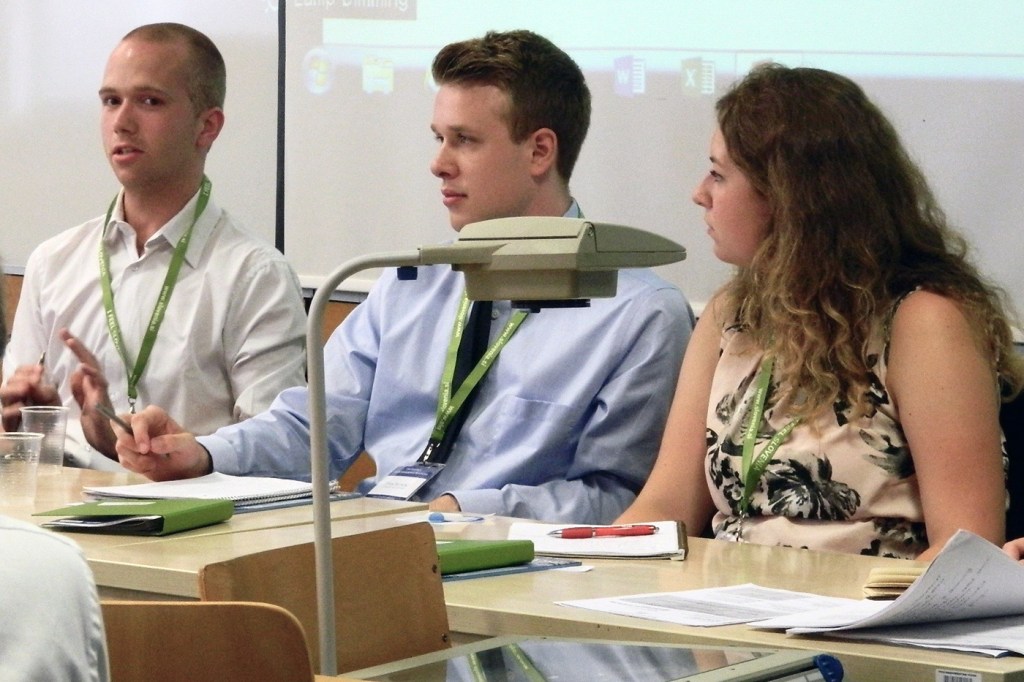In Slovenia, Northeastern students present research on international criminal tribunal

Last week, at an international conference in Slovenia, a group of Northeastern students presented their research examining a criminal tribunal established to handle war crimes stemming from the conflicts in the Balkans in the early 1990s.
The students’ global learning experiences inspired the research project, which is nearly two years in the making.
In the summer of 2014, three of the students— Evan Bruning, SSH’17, and Mara Scallon, S’16, and Jane Rudy, SSH’16—met on a Dialogue of Civilizations program in Bosnia and Herzegovina and Serbia, where they studied the conflict and post-conflict reconstruction in the former Yugoslavia. Bruning said that on the Dialogue, they spoke with observers of the conflicts from various sides and were intrigued to learn more.
“We talked to people about how they were impacted by war and their national conscious,” Bruning said. “It was really fascinating, and we wanted to do more research.”
The students began investigating the topic further, specifically focusing on accusations that the International Criminal Tribunal for the former Yugoslavia is inherently biased against Serbs, who comprise the majority of those convicted. They were soon joined by another student, Jeremia Whall, SSH’16, who himself worked on co-op at the Centre for Applied Nonviolent Action and Strategies in Belgrade, Serbia.
We talked to people about how they were impacted by war and their national conscious. It was really fascinating, and we wanted to do more research.
— Evan Bruning, SSH’17
They received a Provost’s Undergraduate Research and Creative Endeavors Award, which supported their May 2015 visit to The Hague, Netherlands, where the tribunal is located and where they did the bulk of their research. The students spent two-and-a-half weeks there, conducting a series of interviews with representatives from embassies and non-governmental organizations. The visit also included research at the Peace Palace Library, one of the world’s oldest libraries specializing in international law.
“The interviews were really favorable,” Scallon said. “They were excited to help with our research, and [we gained] a lot of credibility from having done the Dialogue.” The students recalled that one particularly enthusiastic representative from the Croatian embassy met them carrying six binders full of papers and spoke with them for nearly two hours.
Working on the research project also motivated Bruning to pursue a co-op at the Office of the High Representative in Sarajevo, Bosnia and Herzegovina. He worked there from July through December 2015. Bruning worked for the head of the office’s political and economic area, which focuses on promoting political reconciliation, sustainable economic development, and on integrating Bosnia and Herzegovina into the international community.
This spring, the students showcased their research at RISE:2016 and at the 2nd Annual CSSH Undergraduate Research Forum. Then on June 24, Bruning, Scallon, and Rudy presented at the CEEISA-ISA 2016 Joint International Conference in Slovenia’s capital city of Ljubljana. They joined professors from Arizona State University and Tulane University and a researcher at The Hague Institute For Global Justice as part of a panel on international courts and tribunals.
“We were very proud to be perhaps the only undergraduate students presenting research [at the conference],” Scallon said, noting that attendees were impressed with the quality of their research, writing, and presentation.
Ultimately, the students found that the tribunal doesn’t suffer from inherent bias, but that there are several problems that undermine its effectiveness and impartiality. They said institutional weaknesses and a lack of accountability within and outside the tribunal have allowed the biases of individual actors to influence the outcome of proceedings. Claims of bias have also been quickly dismissed, which has bred resentment and demonstrated the failure of the global community to view the Balkan conflict in a nuanced manner, they said.
“By neglecting to address the need for impartiality and accountability within each step of the legal process, the architects of the ICTY and the international community alike failed to produce a universally impartial institution,” the students wrote in an article about their research for NU Political Review. “The structural and procedural weaknesses of the Tribunal exacerbate issues inherent in international justice, challenge reconciliation efforts in the Western Balkans, and allow the predominant narrative of the Bosnian war to creep into court proceedings.”
The students received funding from the International Affairs Undergraduate Research Fund and the College of Social Sciences and Humanities Undergraduate Research Initiative to attend the conference.





